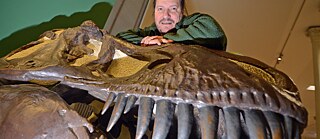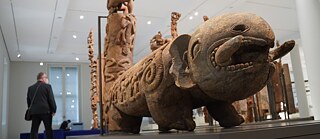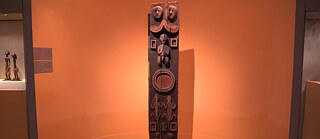Controversial Restitution Who Owns the Dinosaur?

Dispute between Brazil and Germany over a rare dinosaur fossil generates discussion about colonialist practices in science. Meanwhile, scientific studies of the animal are suspended.
In Brazil, however, the news caused indignation. Brazilian paleontologists said they had no knowledge of the mini-predator’s existence, and much less so that it had been housed in the Museum of Natural History Karlsruhe, in Germany, since the 1990s. The Brazilian Society of Paleontology (SBP) suspected that Ubirajara had been taken out of the country illegally. With the slogan #UbirajarabelongstoBR (“Ubirajara belongs to Brazil”), paleontologists utilised social media to demand the Ceará dinosaur’s return. In response to the barrage of criticism, the German museum argued that the acquisition of the fossil had occurred in accordance with international conventions, stating that “Ubirajara is the property of the state of Baden-Württemberg.”
A Legal, Political, and Scientific Issue
“The absence of this fossil in Brazil is not only a legal and political issue, but also a scientific one, because it undermines the development of our science,” declares Renato Ghillardi, president of the SBP. He says that friendly requests to return the fossil through institutional means were not met, and now the Public Prosecutor’s Office is trying to repatriate it. “It is important to keep the material here, so the population understands that the fossil is our patrimony, and to facilitate the work of young Brazilian researchers. If it had been returned, a series of studies on the dinosaur would have been carried out here, promoting science in Brazil,” the scientist believes.As a result of the imbroglio, the Cretaceous Research journal took the article about Ubirajara offline until the circumstances around its removal from Brazil are clarified. In other words, scientific studies of the animal are temporarily suspended. For science, Ubirajara no longer exists.
Scientific Colonialism?
The Ubirajara case is part of the larger recent debate about how scientific research on fossils should be carried out in the 21st century. Once they are brought to rich countries, where they are studied and conserved in popular museums, the fossils do not usually make it back to their place of origin. In some scientist’s view, especially concerning peripheral countries, the practice will replicate a colonialist paradigm that dates back to the 19th century and to the early days of paleontology. European researchers, in turn, are critical of some countries’ rigid regulation, which would block access to the fossils and slow down the advancement of science. In Brazil, fossils have been considered state property since 1942, and their commercialisation is a crime.Eberhard Frey, curator of the Karlsruhe museum and co-author of an article about Ubirajara, told a local newspaper that “the creature is poorly conserved, and up to now had interested no one. At the time, the piece was completely run aground.” Questioned on email about the content of his statement, Frey merely stated that legal matters concerning the dinosaur are being clarified by the Ministry of Science of the state of Baden-Württemberg. “Let’s wait and act based on the results of the investigation. Not by a longshot would we want to retain in our collection material acquired in a demonstrably illegal manner,” Frey wrote.
Safeguarding in the Place of Origin
The controversial British paleontologist David Martill, another co-author of the article, has suggested publicly that, had it been in Brazil, Ubirajara could have had the same fate as the National Museum’s pieces, which were consumed by flames in a fire in 2018. The argument that Brazilian institutions do not have the means to conserve fossils cannot be used to justify that they stay abroad, believes Anauene Dias Soares, a lawyer specialised in the illicit trafficking of cultural goods.To enhance their structure, she explains, Brazilian museums need to attract visitors and financing. For that, their collections must be relevant - thus the importance of keeping Ubirajara here. “It is very complicated to argue that foreign institutions have better means and structures to safeguard the material. Why don’t they work together to safeguard it in its locality?” the expert asks. “This good [the Ubirajara fossil] should not have left Brazil,” she asserts. The SBP assures that, in the country, there are institutions highly capable of safeguarding their pieces. One of them, the Museum of Paleontology Plácido Cidade Nuvens, is in Araripe, where Ubirajara was found.
“Paleopiracy”
In the region of Araripe, fossil trafficking is not uncommon. In its calcium-rich rocks, precious remains of insects, fish, plants, and dinosaurs abound, which decades ago fueled the international fossil market. Many are advertised in online auctions and sold at exorbitant prices. Others are discovered by appearing in scientific publications. That is what happened in May 2021, when The Journal of Arachnology described a new species of Brazilian spider. After verifying that it had left the country illegally, the material was returned by the University of Kansas, USA, to the museum in Araripe.The president of the SBP believes that the legal battle for Ubirajara’s return could take years. Media coverage of the case, however, has already proven effective. Some European institutions were willing to return other fossils that had been collected illegally on national land. “The University of Exeter, in England, is going to return a collection of 200 insects to Ceará. And the University of Tübingen, in Germany, the fossil of a fish, to rebuild the National Museum’s collection,” Ghillardi celebrates. “Latin American paleontological associations are meeting to write a joint article and address this issue of certain European countries’ behavior. It is a work of awareness,” he concludes.
Editor’s note: The Ubirajara jubatus fossil was returned to Brazil on 12 June 2023.


